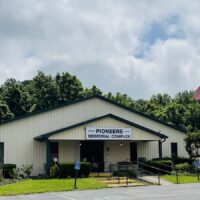Four in seven Kentucky adults (57%) think the pandemic is over in the state and more than 80% say concerns about COVID-19 will not keep them from attending or hosting gatherings during the holiday season, according to a Foundation for a Healthy Kentucky poll taken from Oct. 29 to Dec. 4.
“Kentuckians are, I think as a general matter, determined that this pandemic is over,” Ben Chandler, president and CEO of the foundation, said Tuesday. “They’re going to behave like it for the most part during the holidays.”
Chandler said that’s appropriate, if people are up-to-date on their COVID-19 and flu vaccinations, keeping their hands washed and staying home when they are sick. But the poll found that resistance among unvaccinated Kentuckians to getting vaccinated to protect them from the disease continues to increase.
The poll found that 59% of Kentucky adults said it is “not likely at all” that COVID-19 will prevent them from attending or hosting a small gathering with friends and family this holiday season and 22% said it is “not too likely” that COVID-19 will impact this decision. Only 4.4% said it is “very likely” and 12.5% said it is “somewhat likely” that COVID-19 will affect their decision to gather with others over the holidays.
Being vaccinated didn’t seem to matter when making the decision to attend or host a small holiday gathering, as 73% of those who were vaccinated with at least one booster, 86% of those who were vaccinated with no boosters and 91% of those who were not vaccinated said they were either not likely at all or not too likely to let COVID-19 impact their decision to attend or host a small holiday gathering
Further, the poll found that more men (69%) than women (50.2%) said they were not likely at all to let COVID-19 prevent them attending or hosting a small holiday gathering.
Hanukkah begins Sunday, Dec. 18; Christmas is Sunday, Dec. 25, and Kwanzaa starts Dec. 26.
The poll was the latest edition of the Vaccines in Kentucky Poll, which the foundation has sponsored four times since February 2021.When asked if they thought the pandemic was over in Kentucky, 41.5% of the respondents said it was. That was an increase over the summer, when 31.7% said it was.
The share of Kentucky adults who said the pandemic was not over decreased to 56.6% in the latest poll, down from 65.4% in the summer.
And when asked if the pandemic was over as it pertains to their own lives, 58.1% of the respondents said it was, up from 53.3% in the summer poll. This rate was highest among Kentucky adults who were not vaccinated (80.1%), followed by those vaccinated but not boosted ( 61%) and those vaccinated with at least one booster (42.2%).
The poll also found that nearly three-quarters of vaccinated Kentuckians (73%) were either “very likely” or “somewhat likely” to get an annual COVID-19 booster if that were recommended like annual flu shots are.
The groups of vaccinated Kentuckians most resistant to getting an annual COVID-19 booster in the future were those who live in suburban counties (37%) and those between the ages of 30 and 45 (39.5%), either saying they were either “not too likely” or “not likely at all” to receive an annual booster.
In rural and urban counties, about 75% of Kentucky adults in these areas said they would be very or somewhat likely to get a booster if recommended.
Since the first Vaccines in Kentucky Poll was taken in February 2021, an increasing share of Kentucky adults have said that getting vaccinated is a personal choice, rather than part of everyone’s responsibility to protect the health of others. That view rose to 65% in the latest poll, marginally more than the 63% found this summer. In February 2021, shortly after vaccines became available, polling showed a nearly even split on the question. (Each number in the statewide sample has an error margin of plus or minus 3.4 percentage points.)
The belief that vaccination is a personal choice is greatest among rural Kentuckians, with 72% of them saying they agree with that statement and 27% of them saying getting vaccinated is everyone’s responsibility to protect the health of others. In suburbs, the numbers were 66% and 32%, respectively; in cities, they were 57.5% and 41.8%.
The latest poll also found that the number of unvaccinated people in Kentucky who said they will “definitely not get the vaccine” has increased to 75.2% in the latest poll, up from 63.5% in the summer.
The poll, which was funded by the foundation, was conducted by the University of Cincinnati’s Institute for Policy Research. It surveyed a random sample of 855 Kentucky adults via landline and cell phones.
Melissa Patrick is a reporter for Kentucky Health News, an independent news service of the Institute for Rural Journalism and Community Issues, based in the School of Journalism and Media at the University of Kentucky, with support from the Foundation for a Healthy Kentucky. She has received several competitive fellowships, including the 2016-17 Nursing and Health Care Workforce Media Fellow of the Center for Health, Media & Policy, which allowed her to focus on and write about nursing workforce issues in Kentucky; and the year-long Association of Health Care Journalists 2017-18 Regional Health Journalism Program fellowship. She is a former registered nurse and holds degrees in journalism and community leadership and development from UK.






